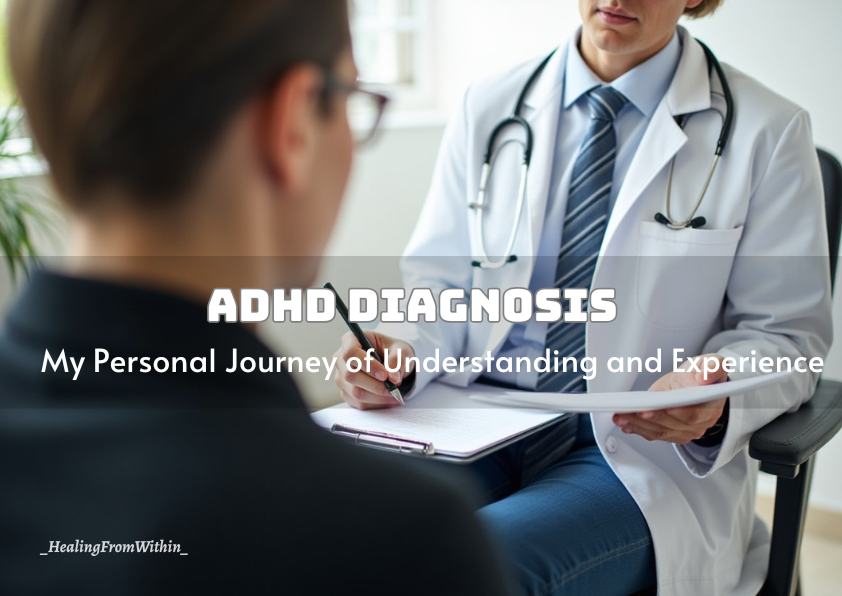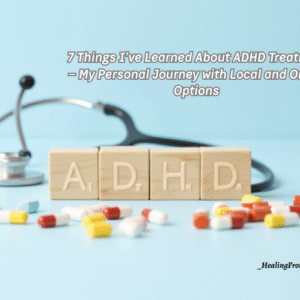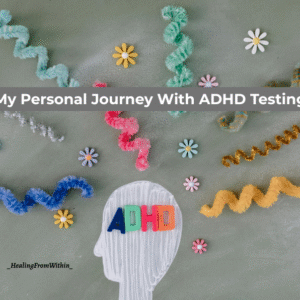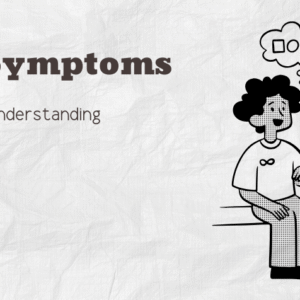Sharing my journey of ADHD diagnosis – from in-person and online assessments to finding services near you.I used to think ADHD only affected children, but I gradually noticed challenges in my life: forgetfulness, difficulty focusing, constant restlessness, and trouble organizing time. These difficulties affected my work, studies, relationships, and mental health.This journey began with curiosity and became a process of self-discovery. In this article, I will share my personal experience: identifying symptoms, finding services, undergoing both in-person and online assessments, as well as practical tips, advice, and strategies after receiving a diagnosis, aiming to help those who suspect they may have ADHD find guidance and understanding.
Understanding ADHD Diagnosis: My Personal Perspective
Before diving into my personal experience, I want to share how I first learned about ADHD and why it caught my attention. Understanding ADHD prompted me to start noticing certain symptoms in my daily life. Here’s the story of the first time I truly realized I might have ADHD.
My First Encounter with ADHD Diagnosis
The first time I heard about ADHD, I pictured hyperactive children who could not sit still in class. I had never thought adults could have ADHD. But when I learned about adult ADHD diagnosis, I realized that ADHD often manifests subtly in adults: difficulty focusing, poor time management, distractibility, and mental restlessness.
I felt both curious and anxious. I began observing myself, noting moments of distraction, restlessness, or feeling unable to complete tasks on time. I realized that many daily struggles were not just personality quirks but possible ADHD symptoms. That’s when I thought, “Maybe I should take this seriously and consider an ADHD evaluation.”

Key Symptoms That Prompted My ADHD Diagnosis
Through observation and self-assessment, I identified the following key symptoms:
- Forgetfulness: I often missed appointments, even with reminders and careful schedules, which caused stress and self-blame.
- Difficulty focusing: I could only maintain focus for a few minutes before my mind wandered to other ideas or tasks, causing projects to drag on and remain unfinished.
- Restlessness: I always felt the need to do something or move, even without extreme hyperactivity. My mind felt like it was constantly “running,” never fully at rest.
- Disorganization: Difficulty prioritizing tasks often led to unfinished projects, affecting work or school deadlines.
These signs helped me understand that ADHD isn’t just a childhood issue – it profoundly affects adults’ work, studies, and relationships. Recognizing this was the first step toward practical solutions rather than self-blame.
The Importance of Understanding My ADHD Diagnosis
Recognizing ADHD changed how I viewed myself and my daily life:
- Stop self-blame: I no longer saw mistakes or procrastination as laziness or lack of determination. Instead, I learned to understand my limits and manage them effectively.
- Apply time management strategies: Knowing ADHD was the cause, I started using techniques like breaking tasks into smaller steps, using reminder apps, and creating detailed plans.
- Reduce stress and improve relationships: When loved ones and colleagues understood ADHD, they were more empathetic and supportive, reducing pressure and improving relationship quality.
- Lay the groundwork for therapy and habit changes: Awareness of ADHD allowed me to pursue behavioral therapies, organizational habits, and other supportive measures more effectively.
Recognizing ADHD Diagnosis in Adults: My Personal Insights
As I explored the process of ADHD diagnosis in adults, I began reflecting deeply on my daily behaviors and challenges. This reflection highlighted patterns that set me apart from others, leading me to understand more clearly how ADHD manifests in my life. These insights naturally led me to realize the ways in which I was different.

How ADHD Diagnosis in Adults Helped Me Realize I Was Different
I noticed differences when:
- I struggled to sit still in long meetings, always wanting to stand or move.
- I often forgot important details at work while colleagues managed them easily.
- I found it difficult to focus on a single task, easily distracted by external or internal stimuli.
These differences made me wonder: “Am I missing something important about myself?” This awareness opened the path to seeking a formal adult ADHD diagnosis, helping me understand that these challenges were not just personal quirks but potential symptoms of ADHD in adulthood.
Managing Time and Tasks: Insights from ADHD Diagnosis in Adults
Even after trying to-do lists, reminder apps, and detailed schedules, results were inconsistent. Stress, overwhelm, missed deadlines, and unfinished work were common. These are typical challenges adults face, and pursuing an adult ADHD diagnosis helped me realize that such difficulties are often related to ADHD rather than “lack of self-discipline.
When I Realized It Was Time for an ADHD Diagnosis in Adults
Realizing I might have ADHD brought anxiety but also relief: anxious about results, relieved that my struggles could finally be explained scientifically. This awareness gave me hope for effective treatments and management strategies and motivated me to prepare symptom records and notes for a smoother assessment.
ADHD Diagnosis Near Me: Finding Local Services
Once I decided to pursue a formal diagnosis, my next step was to find local services. I turned to online searches to explore options nearby, hoping to identify trustworthy clinics and specialists who could guide me through the process.
How I Found ADHD Diagnosis Near Me Through Online Searches
I searched “ADHD diagnosis near me” and “adult ADHD diagnosis near me” on Google. Initial results were overwhelming. Many sites looked professional but lacked clear information on expertise, costs, or procedures.
I realized top search results weren’t always reliable. I filtered based on:
- Clinic credibility
- Community reviews
- Specialist experience
- Clear guidance on the diagnosis process
I also checked forums and social media groups for real-life experiences about wait times, service quality, and the evaluation process.

Reaching Out to Clinics for ADHD Diagnosis Near Me
After narrowing down my options, I reached out to clinics directly to inquire about procedures, costs, appointment availability, and necessary documents. Some clinics even offered preliminary phone or email consultations, guiding me on how to complete symptom questionnaires and record daily habits, work, and study routines. Searching for ADHD diagnosis near me and preparing in advance significantly reduced my anxiety and helped me select a clinic with professional, knowledgeable, and supportive staff.
Learning from Community Experiences with ADHD Diagnosis Near Me
I joined online communities on Facebook and Reddit where people shared experiences with adult ADHD diagnosis. Tips included:
- Bring a symptom journal: Record daily struggles, distractibility, and restlessness.
- Note work and study challenges: Provide concrete examples rather than general statements.
- Prepare lists of difficult and positive habits: Makes evaluation more effective and reduces stress.
These insights helped me select the right clinic, prepare effectively, and feel confident in the ADHD diagnosis journey.
What I Experienced During an Online ADHD Assessment ?
With a busy schedule and some clinics located far from where I live, I decided to explore online ADHD assessments. This approach offered flexibility and convenience while still providing access to certified professionals who could evaluate my symptoms accurately.

Choosing Online ADHD Diagnosis: My Reasons and Experience
Due to a busy schedule and some clinics being far away, I opted for online ADHD Diagnosis. This approach is convenient, time-saving, and allows evaluation at home. Certified specialists ensure accurate and reliable results.
Pros and Cons of My Online ADHD Diagnosis Experience
Pros:
- Completed at home, saving travel costs and time.
- Flexible scheduling for busy individuals or those living far from clinics.
- Some platforms provide pre-assessment guidance, reducing anxiety.
Cons:
- No direct observation; specialists rely on self-reported data.
- Requires stable internet and reliable devices.
- Limited interaction can make it harder to convey details fully.
Online ADHD Diagnosis Platforms I Used and My Experience
I used ADHD Diagnosis Online and ADHD Advisor, both professional and user-friendly. The process helped me:
- Understand my condition and confirm daily symptoms.
- Receive scientific explanations, reducing self-blame.
- Gain motivation to plan habits and manage ADHD in work, study, and daily life.
Online assessments also provided opportunities to connect with ADHD support communities and learn effective management strategies.
The ADHD Diagnosis Process: What I Learned
Before my ADHD diagnosis, I took time to gather and organize detailed information about my symptoms, daily challenges, and how ADHD affects my life. This preparation not only made the assessment process smoother and more accurate but also helped reduce the anxiety I felt before meeting with a specialist for my adult ADHD diagnosis.
Preparing for an ADHD Diagnosis: Symptom History and Personal Information
Before the assessment, I prepared detailed information about symptoms, challenges at work and school, daily routines, and ADHD’s impact on life. This preparation made the adult ADHD diagnosis process smoother, more accurate, and less stressful.
ADHD Diagnosis: Completing Questionnaires and Specialist Interviews
- ASRS questionnaire: Self-assessment of current symptoms and their impact on daily life.
- Specialist interviews: Determine severity, rule out other disorders, and provide a comprehensive evaluation.
These steps helped me understand my condition and ensured the evaluation was thorough and professional.
Receiving ADHD Diagnosis Results and Specialist Guidance
Receiving the ADHD diagnosis was a huge relief. Finally, all the challenges I had faced had a scientific explanation. Specialists recommended management strategies for my adult ADHD diagnosis, ranging from medication to behavioral therapy, and guided me in improving daily habits to optimize work, study, and personal life.
The ADHD diagnosis wasn’t just a label – it became a stepping stone to understanding myself, embracing my strengths, and improving my overall quality of life
Challenges While Waiting for ADHD Diagnosis Results
While waiting for my ADHD diagnosis results, I quickly realized that the period of uncertainty could be just as challenging as the symptoms themselves. Anxiety and self-doubt often crept in, making it difficult to stay focused on daily tasks or maintain a sense of control.

Anxiety and Uncertainty While Awaiting ADHD Diagnosis
Waiting for results was stressful. I constantly wondered whether I truly had ADHD and how it would affect my life. This uncertainty sometimes caused sleepless nights and difficulty focusing.
ADHD Diagnosis and Moments of Self-Doubt
I questioned whether my struggles were just procrastination or ADHD. This created moments of helplessness but also motivated me to research and prepare mentally for the outcome.
Tips for Patience While Waiting for ADHD Diagnosis
To manage stress, I:
- Practiced meditation and deep breathing.
- Keep a journal of thoughts, emotions, and symptoms.
- Focused on small daily tasks, regaining a sense of control.
These strategies reduced anxiety and prepared me to take an active role in managing ADHD after diagnosis.
ADHD Diagnosis and Its Impact on Daily Life
- Work and studies: After receiving my ADHD diagnosis, I realized that difficulty focusing and forgetfulness were impacting my productivity. I began using detailed lists, reminder apps, and structured schedules to manage tasks more effectively, a strategy often recommended for adults pursuing adult ADHD diagnosis management.
- Social and family life: Sharing my ADHD experience with loved ones after the ADHD diagnosis helped them understand my challenges and offer support. This reduced conflicts and strengthened relationships, something many adults find helpful when seeking guidance from ADHD diagnosis near me.
- Mental health: Becoming aware of my ADHD through a formal adult ADHD diagnosis reduced self-blame, increased confidence, and helped stabilize my emotions, making it easier to manage stress and daily life.
Personal Strategies After Receiving My ADHD Diagnosis

- Management planning: After my formal ADHD diagnosis, I started setting daily and weekly goals and tracking progress to maintain structure. This approach is commonly recommended for adults undergoing adult ADHD diagnosis support and management.
- Establish habits and workspace: I minimized distractions, broke tasks into smaller steps, used reminder apps, and applied techniques like Pomodoro. These strategies were especially helpful for those who had sought ADHD diagnosis near me to find local guidance and resources.
- Find support communities: Joining online and local groups allowed me to learn effective management strategies from other adults with ADHD, enhancing my quality of life and reinforcing lessons learned from the ADHD diagnosis process.
Advice for Those Beginning Their ADHD Diagnosis Journey
- Avoid self-diagnosis: Seek professional evaluation rather than relying solely on online information.
- Find reliable sources and specialists: Choose professionals experienced in adult ADHD for accurate diagnosis and management.
- Learn to live with ADHD: Accept, manage, and leverage ADHD traits as strengths rather than limitations.
Conclusion
ADHD diagnosis is not just about labeling – it’s a journey of self-awareness, learning to manage, and living in harmony with oneself. My personal experience shows that early recognition, finding trustworthy services, and applying management strategies improve work, study, and mental health outcomes.
If you suspect you may have ADHD, be patient, seek information, and take proactive steps. ADHD is not a limitation – it is an opportunity to understand yourself and optimize life.
On Pinterest, I share tips, inspiration, and daily resources for adults with ADHD, and you can explore my books and guides on Amazon. Together, we learn, grow, and seek clarity.




